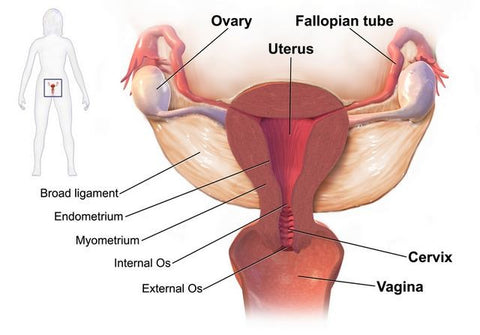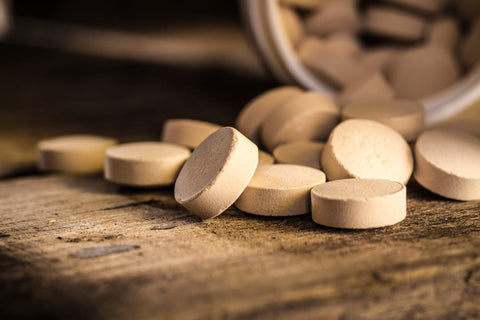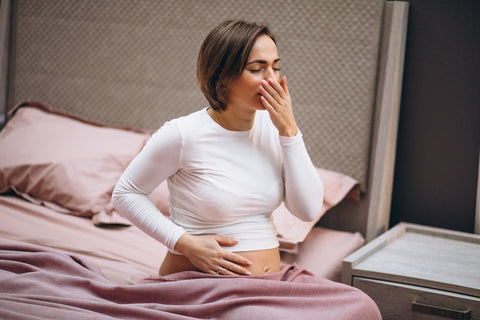One in three (aged 15-45) women develop bacterial vaginosis (BV) due to different factors, leading to a deficiency of Lactobacillus, a type of probiotic bacteria in the vagina.

Key Causes
The main cause of bacterial vaginosis is a lack of lactic acid and beneficial bacteria (Acidophilus strains) in the vagina caused by the following factors:
Frequently irritating (douching) the vagina, cleaning the vagina with unnatural antibacterial soaps, using laundry detergents with perfumes, dyes and irritating chemicals and using unnatural antibacterial bath liquids. Furthermore, hormonal imbalance, antibiotics, poor diet, stress and alcohol, etc.
Healthy vaginal pH levels are acidic (pH 3.5–4). A lack of probiotics in the vagina increases pH to over 4.5 making it too alkaline and leading to bacterial vaginosis.
Lactobacillus is the dominant bacteria in a healthy vagina. It maintains proper acidity and helps fight off infectious bacteria.
Symptoms
Vaginal discharge with a fishy smell, itchy skin, dry skin or skin conditions, pain when urinating, uterine infections, etc. However, since symptoms are often mild most women do not know they have bacterial vaginosis.
Possible Complications
If untreated, it can lead to premature babies (not reaching full term, 37 weeks), birth defects when the baby is born and increased susceptibility to sexually transmitted diseases, which can also affect your sexual partners.
It can even lead to kidney stones. It is, therefore, very important to prevent and treat bacterial vaginosis by increasing Lactobacillus in the vagina.
Beneficial Probiotics
- Take a good quality probiotic supplement internally and externally (intravaginally). It should contain mostly Lactobacillus strains as research shows they play an important role in maintaining vaginal health.
Beneficial strains include L. rhamnosus, L. acidophilus, L. reuteri, L. gasseri, L. paracasei as research shows each one of them plays an important role in maintaining vaginal health.
It has been scientifically proven that taking probiotics orally and externally treats bacterial vaginosis effectively and reduces recurrence. Orally taken probiotics can find their way to the vagina and cures bacterial vaginosis.
Lactobacillus strains are found in both FemProbio and UltraProbio and have proved to be very beneficial in preventing and treating bacterial vaginosis, vaginal yeast infections and urinary tract infections (UTI).
- This is the same way probiotics benefit bacteria in the gut and have even been known to improve mood through the gut-brain barrier. Research shows “Probiotics taken orally transfer to the vaginal tract after they are passed from the rectum.”
This means that when you go to the toilet, probiotics somehow sneak from the anus into the vagina, the same way that probiotics benefit the colon.
Have you ever been tempted to think that it must be a huge mistake that the vagina is so close to the anus? Well, now we know it is not a mistake, it was designed to make the journey of good probiotics to the vagina a mission possible.
By the way, the closeness of these two body parts allows also newborn babies to get some probiotics. So, please don’t wash your anus with strong antibacterial soaps. Use only natural soaps such as pure Castile.
- Internally take one capsule daily (in mild cases or to prevent bacterial vaginosis) or one capsule two times a day in more severe cases of bacterial vaginosis.
- Although, these probiotics are designed for internal use you will significantly increase their effectiveness by taking them externally (intravaginally) also.
Open one capsule, mix with some clean warm water and carefully apply it in to the vagina, using a vaginal applicator.
Or soak a cotton pad and apply it into the vagina with your fingers. Cover the vagina with a natural pad before bed and leave overnight.
You can repeat this procedure for about 5-6 nights, then once a week, until recovery.
Important Principles to Implement
- Don’t irritate (douche) the vagina as it significantly increases the risk of vaginal infections by reducing the number of beneficial lactic acid bacteria that protect vaginal walls and fight off infectious bacteria and yeasts.
- Bath with some organic apple cider vinegar. This helps to treat bacterial vaginosis by increasing vaginal acidity and causes bad bacteria to die.
Add 2 cups of organic apple cider vinegar into warm bathwater and stay in it for about 30 minutes. Repeat this procedure every day until you notice improvements.
- Many experts recommend giving irritated genital areas some rest by avoiding using soaps and douches for several days and cleaning the vagina with only warm water.
- Use soaps with only natural ingredients and avoid using harsh soaps and products near the vagina and anus.
- Don’t wash the vagina more than once daily as it is naturally able to take care of its own internal hygiene.
- Wash the outside of the vagina (vulva) only once, daily with natural unscented glycerin or Castile soap.
- Use only natural cotton unscented tampons or pads, free from antibacterial chemicals or perfumes, changing them often enough (at least three times daily every four to six hours).
- Avoid using any sprays, perfumed products and lubricants near and especially inside the vagina.
- Use only mild laundry detergents.
- Boost the immune system by taking Vitamin D, Magnesium, Zinc, Selenium, Vitamin B12, Alpha Lipoic Acid, Black Seed Oil and Propolis.
- Avoid or reduce the consumption of dairy products, sugar, refined and processed foods and stimulants.
- Tyr to manage stress, through meditation and breathing exercises.
- Consume more raw vegetable salads and get enough exercise and sleep, etc.
Related Articles
- Candida Overgrowth, Candidiasis, Thrush, Yeast Infection, Fungal Infections
- Probiotics to Support Overall Health
Sources
- https://www.intechopen.com/books/probiotics/dairy-probiotic-foods-and-bacterial-vaginosis-a-review-on-mechanism-of-action
- https://articles.mercola.com/bacterial-vaginosis.aspx
- https://draxe.com/bacterial-vaginosis-symptoms/
Any information or product suggested on this website is not intended to diagnose, treat, cure or prevent any medical condition. Never disregard medical advice or delay in seeking it because of something you have read on this website. Consult your primary healthcare physician before using any supplements or making any changes to your regime.




